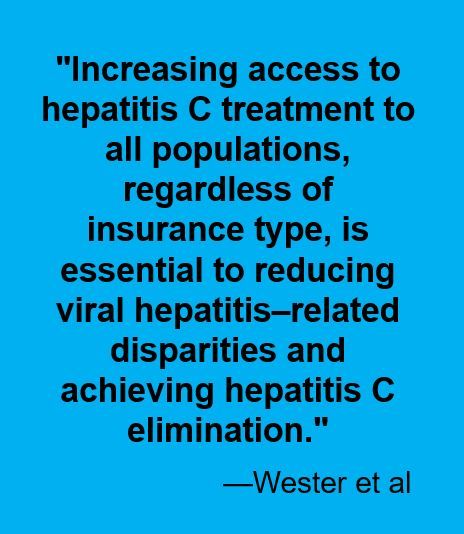- Clinical Technology
- Adult Immunization
- Hepatology
- Pediatric Immunization
- Screening
- Psychiatry
- Allergy
- Women's Health
- Cardiology
- Pediatrics
- Dermatology
- Endocrinology
- Pain Management
- Gastroenterology
- Infectious Disease
- Obesity Medicine
- Rheumatology
- Nephrology
- Neurology
- Pulmonology
Less Than One-third of Adults with HCV Get Timely Treatment, According to New CDC Report
Timely initiation of DAA treatment, regardless of insurance type, is crucial in reducing HCV-related death, disparity, and transmission, concluded CDC researchers.
©bluebay2014/AdobeStock

Few insured adults in the US with hepatitis C virus (HCV) infection receive timely treatment despite the availability of highly effective direct-acting antiviral (DAA) medication, according to new data from a Centers for Disease Control and Prevention (CDC) Vital Signs report.
Findings showed that among patients with HCV and continuous insurance coverage, approximately one-third of those with private insurance and one-quarter of Medicaid and Medicare recipients initiated DAA treatment within 1 year of diagnosis.
“Roughly 1% of the U.S. adult population has hepatitis C. It is a leading cause of death in the US, contributing to the deaths of about 14 000 people each year,” said CDC Acting Principal Deputy Director Debra E. Houry, MD, MPH, during a press briefing. Houry added that the number of new HCV infections in the US has steadily increased since 2010, which she said is “another dire outcome of our nation’s opioid crisis.”
“Given this growing burden, it is critical that we understand how to reach more people with hepatitis C treatment, including people with substance use disorder, to save lives and to prevent the ongoing spread of this serious infection,” stated Houry, who was not involved in the study.
Investigators used data from HealthVerity—a national administrative claims and encounters database—to construct a cohort of adults aged 18-69 years who were diagnosed with HCV between January 30, 2019, and October 31, 2020, who were continuously enrolled in insurance for ≥60 days before and ≥360 days after diagnosis. Researchers used multivariable logistic regression to assess the association between initiation of DAA treatment and sex, age, race, payor, and Medicaid restriction status.
Findings
Data showed that overall, prevalence of DAA treatment initiation within 360 days of the first positive HCV RNA test result among Medicaid, Medicare, and private insurance recipients was 23%, 28%, and 35%, respectively. Among those treated, 75% of Medicaid recipients, 77% of Medicare recipients, and 84% of those with private insurance, initiated treatment within 180 days of diagnosis.
The study showed that treatment rates varied by insurance type. Medicare and Medicaid recipients with HCV were 46% and 38% less likely, respectively, to receive timely treatment compared with those with private insurance.

Among Medicaid recipients, lower odds of treatment initiation were found among those in states with Medicaid treatment restrictions (adjusted odds ratio [aOR], 0.77; 95% CI, 0.74-0.81) than among those in states without restrictions, and among Black or African American persons (aOR, 0.93; 95% CI, 0.88-0.99) or among people with any other races not listed as white (aOR, 0.73; 95% CI, 0.62-0.88).
“Such disparities could be driven by health system barriers to patient access, lack of provider availability, quality of care, patient distressed, stigma, or language and cultural factors,” said coauthor Carolyn Wester, MD, MPH, director of CDC’s Division of Viral Hepatitis, during the briefing.
After adjusting for insurance type, results showed that treatment initiation was lowest among adults aged 18-29 and 30-39 years with Medicaid or private insurance, compared with those aged 50-59 years. This finding is particularly concerning given the fact that in recent years, younger adults have had the highest rates of incident HCV infection, often in association with injection drug use.
Of note, the analysis found that male sex was consistently associated with lower treatment initiation among Medicaid, Medicare, and private insurance recipients (aOR, 0.85, 0.79, and 0.90, respectively).
To ensure patients with HCV are treated, the CDC recommended that health care providers, insurers, policy makers, and public health professionals should work toward removing eligibility restrictions and preauthorization requirements that make it difficult for patients to access treatment; consider providing treatment where patients already receive services, such as primary care offices, community clinics, syringe services programs, substance use treatment centers and correctional facilities; provide treatment in as few visits as possible; and expand the number of primary care clinicians treating HCV.
“Increasing access to hepatitis C treatment to all populations, regardless of insurance type, is essential to reducing viral hepatitis–related disparities and achieving hepatitis C elimination,” concluded Wester and colleagues.
